Key takeaways:
- Data accuracy is crucial for effective SEO reporting, as it influences decision-making and builds credibility with stakeholders.
- Key metrics to track include organic traffic, bounce rate, and conversion rate, which provide insights into website performance and user engagement.
- Customizing reports for different stakeholders and presenting data clearly enhances understanding and fosters better communication about SEO strategies.
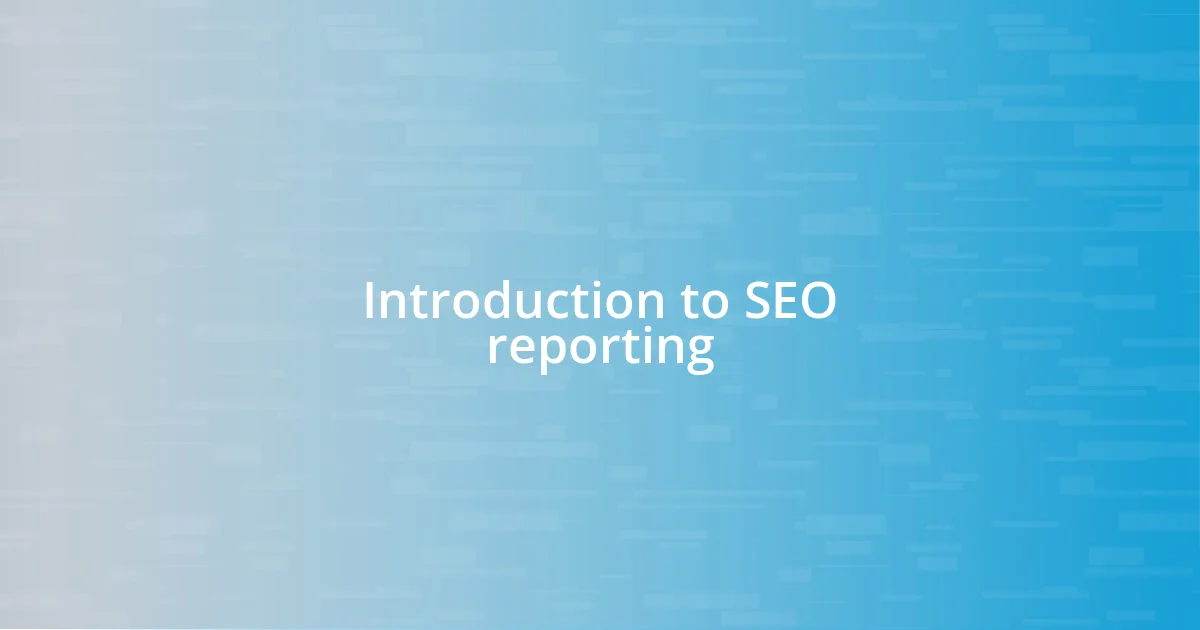
Introduction to SEO reporting
SEO reporting is the process of collecting and analyzing data related to your website’s search performance. Personally, I’ve experienced the revelation of how just a few key metrics can paint a vivid picture of where a site stands in the vast digital landscape. Have you ever looked at your analytics and felt that rush of empowerment when you realize what’s working and what needs tweaking?
When I first started diving into SEO reports, I found the sheer volume of data overwhelming. There are rankings, traffic sources, and engagement rates—all these numbers were like a foreign language. But then I discovered the beauty of storytelling through data; every chart and graph told a chapter of my website’s journey. Isn’t it fascinating how a simple change on your site can lead to significant shifts in performance?
As I’ve honed my approach to SEO, I’ve learned the true value of tailoring reports for different audiences. Whether you’re speaking to stakeholders, clients, or your team, each group will have unique concerns and interests. Crafting a report that resonates can feel like crafting a fine piece of art—what metrics will best illustrate your findings?

Importance of data accuracy
Data accuracy is the cornerstone of effective SEO reporting. I remember a time when I detected discrepancies in traffic data, only to realize that an error in tracking implementation skewed my understanding of performance. It was a hard lesson, highlighting just how critical accurate data is for making informed decisions. When data is trustworthy, it not only reinforces confidence in your strategies but also elevates discussions around performance with stakeholders.
- Accurate data helps in identifying true website performance.
- It builds credibility with clients and team members.
- Decisions based on correct data lead to more effective strategies.
- It enables proper budgeting and resource allocation.
- Discrepancies can mislead actions, resulting in wasted efforts.

Key metrics to track
Tracking key metrics is where the magic of SEO reporting truly lies. I’ve found that focusing on organic traffic, bounce rate, and conversion rate allows me to gauge the health of a website effectively. For instance, when I analyzed a drop in organic traffic, it became clear that a sudden algorithm update had impacted my rankings. I can’t stress enough how vital it is to keep an eye on these metrics; they can lead you to important insights that might just boost your site’s performance.
When assessing user engagement, unique page views are an essential metric. I remember a time when I noticed an uptick in page views on a new blog post. Excitedly, I dug deeper and found that visitors were spending more time on the page, indicating compelling content. This experience highlighted the importance of not just tracking numbers but understanding what they represent—it’s these engagements that truly translate into relationships with visitors.
Lastly, I cannot overlook the significance of tracking your keywords and ranking positions consistently. I recall this one client campaign where we tailored our approach based on fluctuating keyword performance. By honing in on this metric, we increased our targeted organic traffic by 30%. It’s these key metrics that, when monitored closely, allow for adjustments that keep your SEO strategies agile and responsive.
| Metric | Importance |
|---|---|
| Organic Traffic | Indicates overall visibility and effectiveness of SEO strategies. |
| Bounce Rate | Reflects user engagement and the relevance of content. |
| Conversion Rate | Measures effectiveness in driving desired actions from visitors. |
| Unique Page Views | Indicates how engaging content is for users. |
| Keyword Rankings | Essential for SEO success, showing how well your site ranks for targeted search terms. |
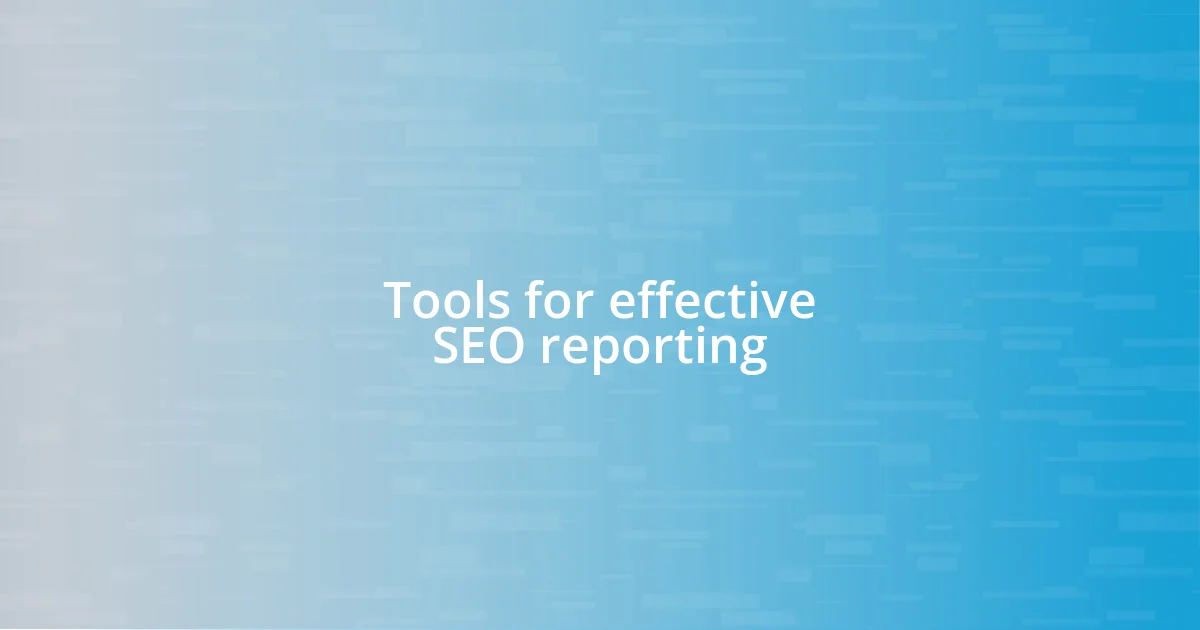
Tools for effective SEO reporting
When it comes to effective SEO reporting, the right tools can make a world of difference. I’ve established a solid routine using Google Data Studio because it allows me to present data in a visually compelling way. I remember the first time I created a dashboard; the clarity it provided was a game changer for my team’s understanding of our data. Think about it—who wouldn’t prefer a colorful graph over a lengthy spreadsheet?
Another tool that has significantly improved my reporting process is SEMrush. It’s not just about tracking keywords; it’s a treasure trove of insights that make you feel enlightened after each analysis. I can still vividly recall an instance when I uncovered a competitor’s backlink strategy. That day, I felt like I had discovered a hidden map that directed me to a treasure chest of opportunities. It sparked a series of successful outreach campaigns that helped us gain valuable backlinks.
Lastly, I can’t emphasize enough the value of using Ahrefs for site audits. The first time I ran an audit, the results were shocking yet enlightening. It made me realize how much we had overlooked, particularly with broken links that could hurt our SEO. I often ask myself, “What areas am I neglecting that could enhance my site’s performance?” Ahrefs has not only answered that question but has also empowered me to take action. These tools don’t just streamline the reporting process; they invite ongoing exploration and improvement.
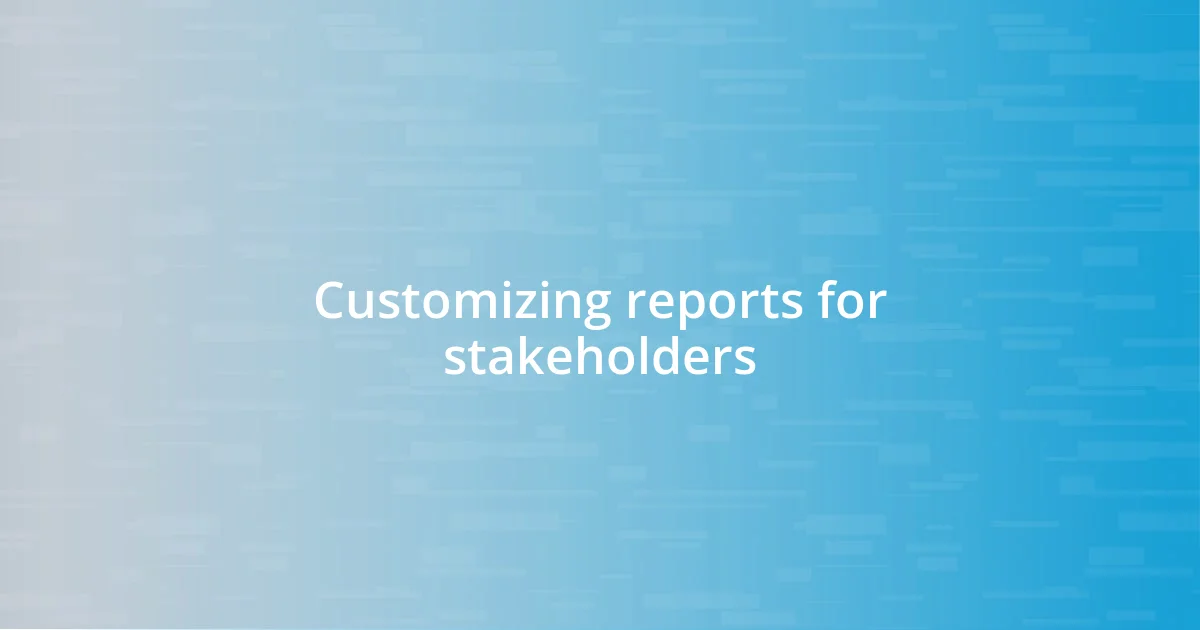
Customizing reports for stakeholders
When customizing reports for stakeholders, I always think about their unique needs and expectations. For instance, I once created a report for a client who cared only about conversion rates. Tailoring my presentation to highlight how SEO changes directly impacted their sales made the information resonate deeply. Isn’t it fascinating how a targeted approach can totally shift a client’s perspective?
I also remember a time when I had to report to a stakeholder focused on brand visibility. Initially, I was tempted to dive into technical metrics, but instead, I showcased organic reach and social shares, illustrating the broader impact of our strategies. Seeing their eyes light up at the mention of increased brand mentions was a reminder that aligning with what matters to stakeholders makes the data more digestible and impactful. Who wouldn’t want their hard work celebrated, right?
Ultimately, I find that versatility is key in reporting. By occasionally incorporating storytelling elements alongside the data, I’ve found that discussions flow more naturally. There was a moment during a quarterly presentation when I shared a success story about a small adjustment we made to a landing page. The result? A 50% increase in engagement! That connection not only captured attention but fostered enthusiasm about future projects. What’s your strategy for keeping your stakeholders engaged?
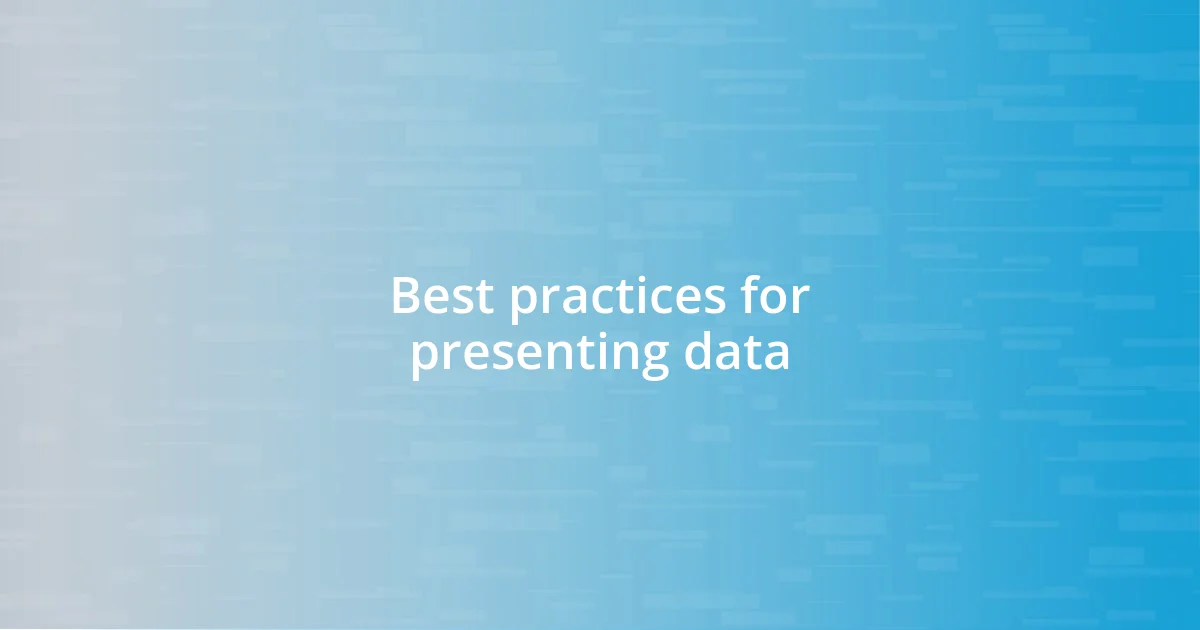
Best practices for presenting data
Presenting data effectively is all about clarity. I once found myself grappling with a complex dataset that left my audience puzzled. It struck me then that simplifying information is crucial. I distilled the content into clear visuals, highlighting key insights. The moment I saw nods of understanding from my audience, I knew that clear presentation can turn confusion into clarity.
When it comes to choosing the right visuals, less can often be more. I’ve had the experience of bombarding my audience with too many graphs and charts, leading to disengagement. Learning from that, I now focus on one or two powerful visuals that tell a story. A simple line graph showing traffic growth over time can be much more impactful than a cluttered slide filled with various statistics. Have you ever noticed how a single striking image can linger in your mind longer than a dozen numbers?
Finally, context is critical. Just presenting numbers isn’t enough; I believe in weaving them into a narrative that adds meaning. I vividly recall a moment when I shared a quarterly report, pairing each data point with an anecdote about our team’s efforts. That not only humanized the data but also sparked genuine excitement in the room. Have you ever seen how a story can breathe life into mere facts? It transforms data from being just numbers to something that resonates on a deeper level.
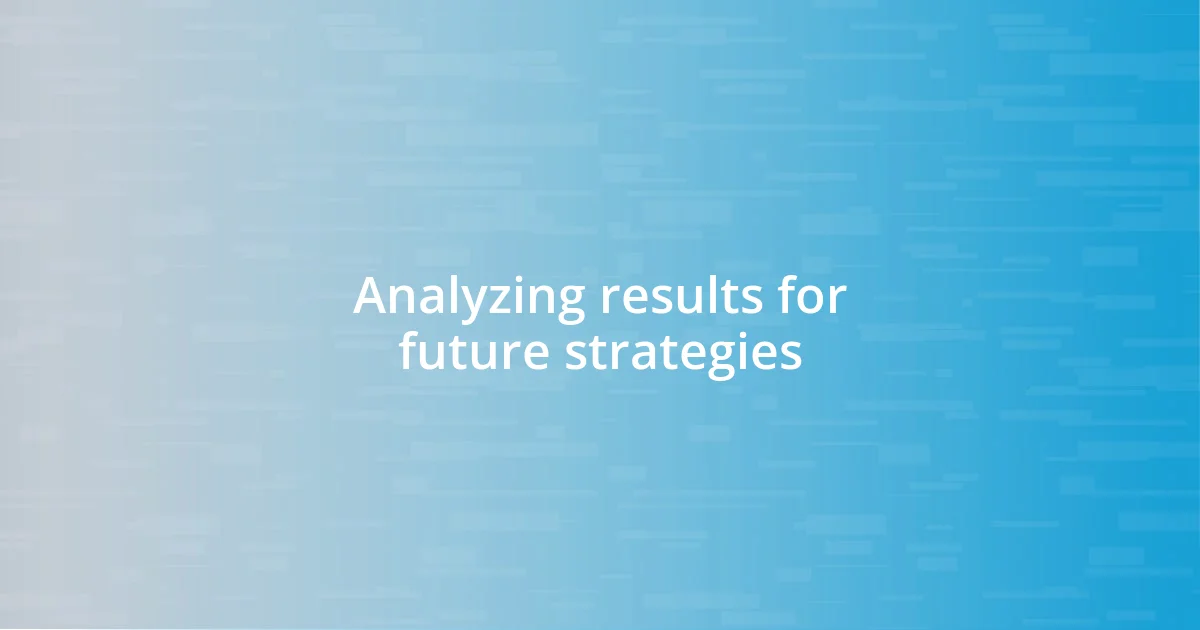
Analyzing results for future strategies
Analyzing results is crucial for shaping future strategies. I remember a time when I scrutinized the performance of a specific keyword strategy. The results were underwhelming, yet instead of feeling disheartened, I saw it as a chance to pivot. By digging into why certain terms weren’t converting, I discovered user intent had shifted, prompting me to adjust our approach. Isn’t it empowering to transform setbacks into stepping stones for growth?
I also find it essential to involve the team in this analysis process. Once, we hosted a brainstorming session after our monthly review that highlighted both successes and areas for improvement. Everyone contributed their insights, which led to a collective ‘aha!’ moment—together, we realized that optimizing for mobile had been a game changer in our recent campaigns. Have you ever noticed how collaboration can spark creativity and foster innovative solutions?
Looking forward, I believe that keeping an agile mindset is key. In my experience, an SEO strategy shouldn’t be static. After a deep dive into our analytic trends, I often play with various scenarios. For instance, I hypothesized how a shift toward local SEO could enhance our visibility. Testing that theory proved fruitful, expanding our traffic considerably. Isn’t it exhilarating when a thoughtful analysis translates into tangible results for your strategies?














